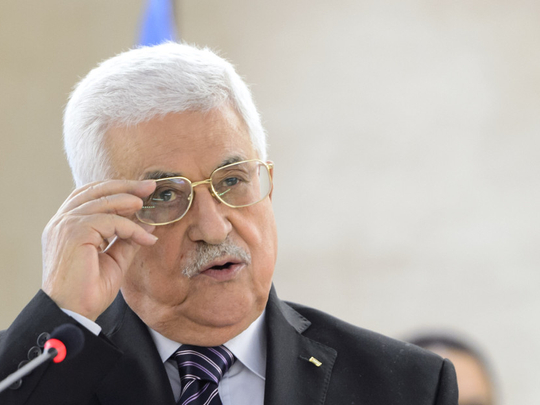
After a few weeks of tactical retreat, Palestinian National Authority (PNA) officials are trying to regain the initiative and re-assert the PNA as the political and moral leader of rebelling Palestinians.
PNA President Mahmoud Abbas and his top official Saeb Erekat led the chorus.
Abbas was the engineer of the Oslo ‘Peace Process’. However, it was those endless and futile negotiations that invited a 20-year political stalemate, which cost Palestinians much land and blood. Speaking to the United Nations Human Rights Council in Geneva recently, Abbas seemed to criticise a process that had been largely concocted by him.
“It is no longer useful to waste time in negotiations just for the sake of negotiations; what is required is the ending of the occupation in accordance with international legitimacy,” he told the Council on October 28. He demanded “strong and decisive intervention”, in Palestine, urging the UN to establish “a special regime of international protection”.
Of course, there is no harm in a moral awakening, but this is hardly what Abbas intended. The current uprising in Palestine has deprived the old guard of whatever little respect and credibility it had among Palestinians. And these very people are now rising up, fully aware that they have no hope or expectations from Abbas, and a peace process which was merely a charade.
Palestinians are seeking mobilisation outside the parameters of the PNA’s self-serving politics, which have achieved little aside from fiery UN speeches, like the one delivered by Abbas last September. At that time, he also demanded international protection, but on both occasions, in New York and Geneva, he failed to present relevant details about his request, as noted in the New York Times.
In fact, considering his intentions of merely ‘appearing’ to be an advocate of Palestinian rights, no details were required. As expected, Israel dismissed his demands and its foreign ministry accused him of “propaganda and incitement, instead of dialogue”, thus returning to the same old discourse of point-counterpoint. All this while scores of Palestinians were killed, hundreds wounded and many more imprisoned in October alone.
The PNA has failed dismally in its mission to lead the Palestinians to liberation or, at the very least, to advance their cause in any way, no matter how slight. However, after many years of attempting to pose as liberation seekers, they have obtained much experience in survival.
Of course, Abbas is not alone, for he represents a large class of wealthy Palestinians, who have used politics to advance their careers, fortunes, or both. One such person is Saeb Erekat, who has been the primary enabler of the PNA charade, its ‘chief negotiator’, and whose protracted term in that precarious post has negotiated nothing of value for the Palestinians. Erekat is an enigmatic character. Despite minimal popularity among Palestinians, he is omnipresent — he appears regularly on television and speaks with the moral authority of an accomplished leader whose legacy is rife with accolades and an astute, unwavering vision.
When Palestinians were polled by the Jerusalem Media and Communications Centre in August, just prior to the current intifada, only 3 per cent approved of Erekat’s leadership, compared with the still meagre approval rating of 16 per cent of his superior, Abbas. Even those who are often cast as alternative leaders, such as Fatah leader, Marwan Barghouti, and former Gaza-based Hamas prime minister, Esmail Haniyeh, were far from popular, achieving 10.5 and 9.8 per cent of the votes, respectively.
The message from Palestinians to the world and to their traditional leaderships was clear: They are frustrated with the old rhetoric, the constant let-downs, the unabashed corruption and the very culture of defeat that has permeated the Palestinian political elite for an entire generation.
As for Abbas, he has operated his political office on the assumption that as long as Palestinians receive their monthly salaries and are content with his empty promises and occasional threats of resignation, resisting Israel and lobbing bombshell speeches at the UN, no one is likely to challenge his reign in Areas A and B. And these meagre areas are nothing but tiny cantons within the Israeli-occupied West Bank and occupied Jerusalem.
However, when Al Jazeera released thousands of secret documents in January 2011, revealing discussions behind closed doors between Israeli and Palestinian negotiators, it was Erekat who was assigned the lion’s share of the blame. With a clear mandate from his superiors, he appeared uninterested in many Palestinian political aspirations, including Palestinian sovereignty in occupied East Jerusalem. His offer was extensive for Israel: The “biggest Yerushalaim in Jewish history, symbolic number of refugees return, demilitarised state ... what more can I give?” was quoted in the Palestine papers.
What is particularly interesting about Erekat, and equally applicable to most PNA leaders and officials, is that no matter how devastating their roles — which they continue to play out, whether through political incompetence or outright corruption — they do not seem to disappear. They may change position, hover around the same circle of failed leadership, but they tend to resurface and repeatedly regurgitate the same old language, cliches, empty threats and promises.
In a recent interview with Al Jazeera’s UpFront, Erekat warned that the PNA was on the verge of shutting down, as if the very existence of the PNA was a virtue in itself.
Established in 1994 as a transitional political body that would guide the process of Palestinian independence, the PNA morphed into a security arm that served as a first line of defence for the Israeli army, in addition to guarding its own interests. Billions of dollars later, and after intensive military training provided by the United States, United Kingdom, Italy and other western and ‘moderate’ Arab countries, the PNA security forces have done a splendid job of cracking down on any dissent among Palestinians.
It matters little what Erekat and his Ramallah circle determine as the proper course of action. Not only has his language become obsolete and his references irrelevant, but the entire Oslo ‘Peace Process’ travesty — which delivered nothing but more illegal colonies and military torment — has also died a long time ago. In fact, it was the Al Aqsa intifada in 2000 that killed Oslo, and the ten years between the end of that uprising and the advent of a new one have been filled with mere haggling and desperate attempts at breathing life into a ‘process’ that made some corrupt Palestinians a whole lot richer.
The hope is that the current intifada will cleanse the residue of that dead process, and surpass the PNA altogether, not through acts of violence and vengeance, but rather through the establishment of a new leadership manned by good women and men who are born in the heart of Palestinian Resistance, in the West Bank, Gaza and occupied Jerusalem. The new leadership cannot be imposed from above or achieved after deliberation with ‘moderate’ Arabs, but selected through an organic, grass-roots process that is blind to factional allegiances, religion, gender and family lineage.
If the intifada is to be true to itself, it must seek to break not just the hegemony over the Palestinian political discourse, which is unfairly championed by Erekat and his peers, but political boundaries as well, thus uniting all Palestinians around a completely new political agenda.
There are many opportunists who are ready to pounce upon the current mobilisation in Palestine, to use the people’s sacrifices as they see fit and ultimately, to return to the status quo as if no blood has been shed and no oppression was still in place.
Dr Ramzy Baroud has been writing about the Middle East for more than 20 years. He is an internationally-syndicated columnist, a media consultant, an author of several books and the founder of PalestineChronicle.com. His books include Searching Jenin, The Second Palestinian Intifada and his latest My Father Was a Freedom Fighter: Gaza’s Untold Story. His website is ramzybaroud.net.










